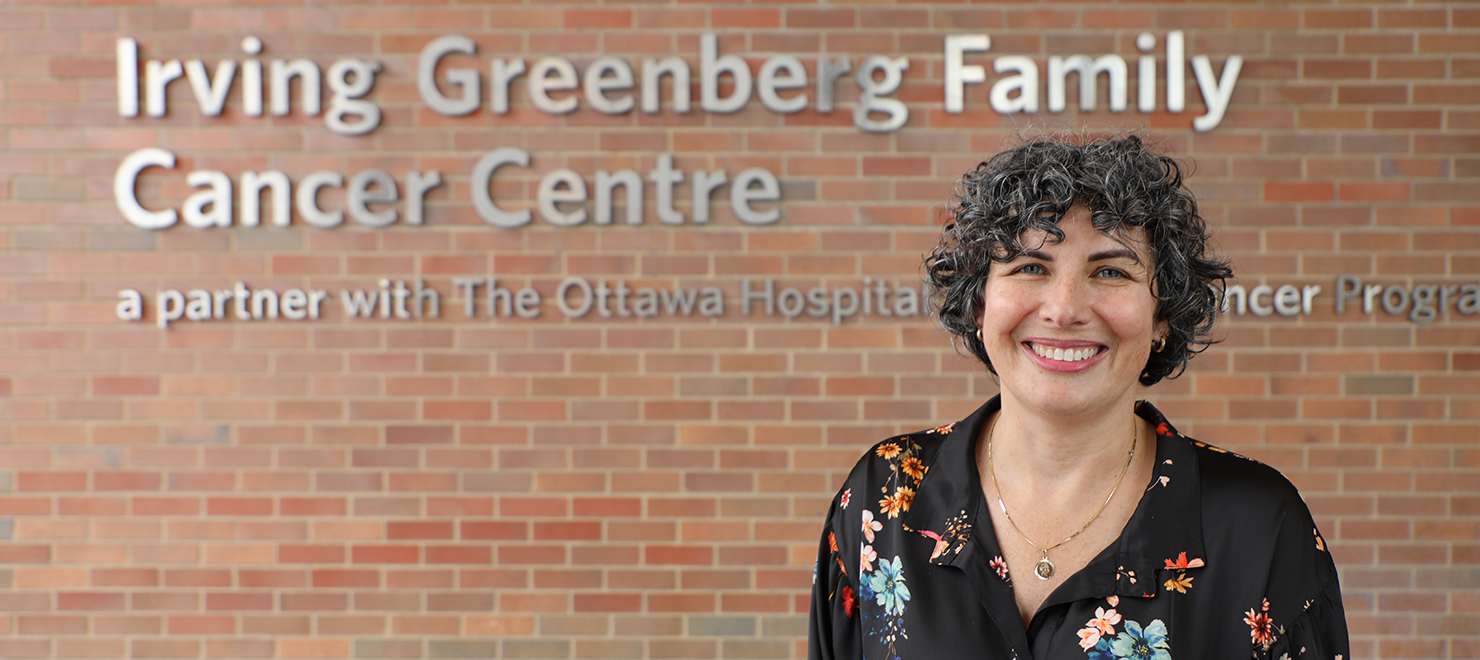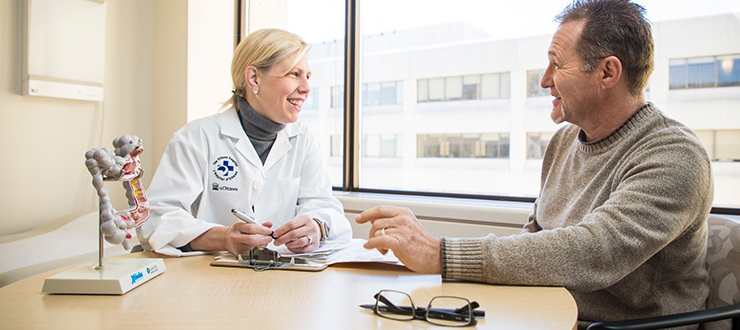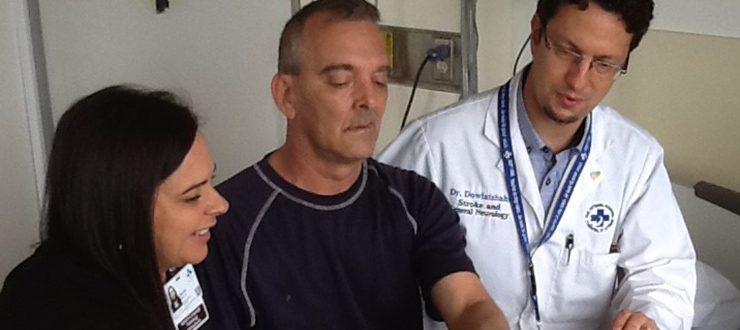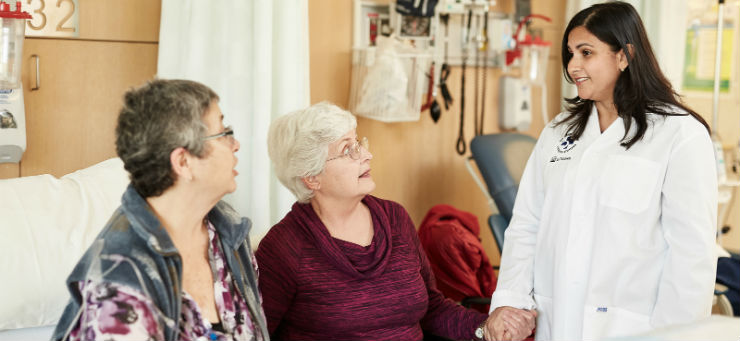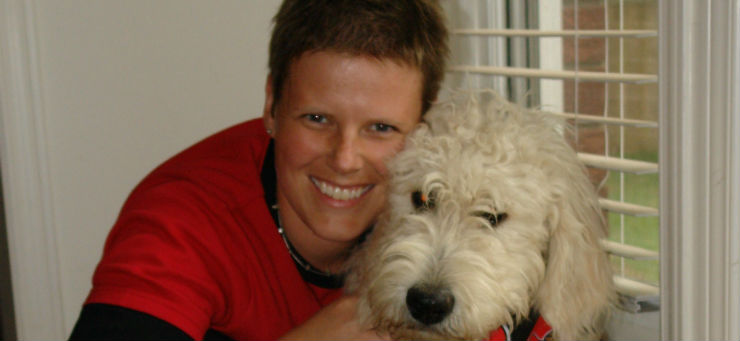
“After the treatment, I never had another attack. I just started to feel better, and totally recovered,” Heather Harris said about her stem cell transplant in 2006.
Heather Harris was driving her fiancé to a golf tournament one morning in 2001 when her right foot went numb. By the end of the day, the numbness had spread up the entire right side of her body.The
then-24-year-old Thunder Bay resident had an MRI, which showed signs of multiple sclerosis (MS). The numbness was her first MS attack.
MS is a devastating disease that occurs when the immune system – which protects against foreign organisms such as viruses or bacteria – mistakenly attacks the body’s own central nervous system, which includes the brain, spinal cord, and optic nerve. Symptoms can range from blurred vision to extreme fatigue to complete paralysis.
Harris needed to see a neurologist, but there were none near her home in Thunder Bay. Her parents lived in Ottawa and had heard about neurologist and MS specialist Dr. Mark Freedman. Dr. Freedman and Scientist Dr. Harold Atkins were leading a world-first clinical trial for MS at The Ottawa Hospital. The trial was investigating whether patients with early, aggressive MS would benefit if their immune system was wiped out with chemotherapy and then regenerated with blood stem cells. The study was showing great success. One trial patient, Jennifer Molson, was featured in the Ottawa Citizen because she no longer exhibited any signs of MS and had recovered from damage already caused by the disease.
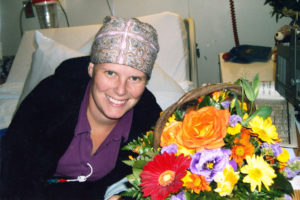
Heather Harris suffered several MS attacks a year before her stem cell transplant in November 2006.
Harris got an appointment with Dr. Freedman at The Ottawa Hospital a few weeks before her wedding; he confirmed that Harris had MS. When she asked about undergoing the same treatment as Jennifer Molson, he said: “You don’t want to have to do that. That is for patients with a very poor prognosis, and it’s difficult to determine if you are in that category yet.” Dr. Freedman wanted to try regular treatments that were much less toxic and life-threatening than the stem cell transplant, since the chemotherapy could cause sterility.
Unfortunately, it turned out that Harris was in the category of ‘poor prognosis.’ She suffered several MS attacks a year. Within a short time, she and her husband stopped canoe-camping because Harris had trouble even carrying a life jacket. She could no longer work the clutch to drive her manual-transmission car. Harris worked in a garden centre but her dream of having her own greenhouse vanished, as it became increasingly difficult to do the physical work. She decided to become a teacher. Her MS got worse while in teacher’s college, and she managed to teach for only two years. Several times, she lost vision in one eye. Even walking became difficult.
Harris’ disease was progressing rapidly. Dr. Freedman told her she would be in a wheelchair within five years.
“Typical of MS, it affects young women in the prime of their lives,” said Dr. Freedman. “It was a daunting problem with Heather living way up in Thunder Bay. With no specialists there, she had to be transferred down to The Ottawa Hospital for treatments. We tried some treatments, but she had an uncontrolled disease and things were advancing quickly. After it was clear we weren’t going to control the disease with medicine, a stem cell transplant was her only option.”
Before Harris took part in the clinical trial, Dr. Freedman asked: “How important is it to you to have kids?” She answered: “It is important, but not as important as it is to walk.”
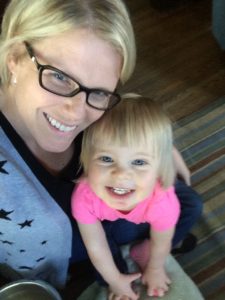
A decade after her stem cell transplant, Heather Harris is proud of her second ‘miracle’ – her daughter Zoe.
“Dr. Freedman did a good job of trying to talk me out of the treatment, but this was my only chance to stop the disease,” said Harris, who understood that the chemotherapy could cause sterility.
Harris and her husband moved to Ottawa for a year while she took part in the trial. She had the stem cell transplant in November 2006.
“It was pretty brutal, but I had such good care. Everyone at The Ottawa Hospital – the nurses and staff – were all amazing,” she said. “After the treatment, I never had another attack. I just started to feel better, and totally recovered.”
Harris, who now works full-time as a school principal, is back to camping, skiing, running and driving a manual car.
“It’s now 11 years since my stem cell transplant,” said Harris. “I really feel like I’m cured.”
However, Harris and her husband wanted to have a baby. A nurse at The Ottawa Hospital suggested that it could be possible with in vitro fertilization. Harris underwent fertility treatments and in 2014 had a baby. Her daughter Zoe is now four years old.

Heather Harris and her husband, Shawn Mizon, celebrated with their daughter Zoe at a friend’s wedding in September 2014.
“A couple of years ago, Heather showed up for her appointment with this little baby. It brought me to tears,” said Dr. Freedman.
“I’ve kind of had two miracles. I am so lucky and incredibly grateful,” said Harris.
In June 2016, Drs. Freedman and Atkins published the results of their clinical trial in The Lancet, a top medical journal. The 24 patients who took part in the trial were followed for up to 13 years. To date, more than 50 MS patients from all over Canada have undergone this treatment, which eliminated all signs of damaging active brain inflammation. Two other sites in Canada – Calgary and Montreal – are now using the treatment developed at The Ottawa Hospital with the same positive, life-changing results.
“I have always been struck by the courage of the patients in this trial,” said Dr. Atkins. “We knew a lot about potential side effects and while we thought it would be effective, we were not 100 percent certain whether this would work. Rather than seeing these young people robbed by the ravages of MS, it is exciting to see them get back to their lives.”
MS research at The Ottawa Hospital is supported by generous donations (opens in a new tab) to The Ottawa Hospital Foundation, as well as organizations such as the MS Society of Canada.

Support patient care and research at
The Ottawa Hospital
You might also like…
By thinking differently, this research team is improving the lives of people with cancer
Taking a different approach to clinical trials, the REthinking Clinical Trials (REaCT) program aims to answer some of the most important and practical questions that affect both patients with cancer and our health-care system. Find out what sets REaCT apart and makes the program so special to participants like Beth.
World-first clinical trial aims to protect cancer patients from COVID-19
Our researchers are leading the way in a world-first clinical trial to protect vulnerable cancer patients during the COVID-19 pandemic.
Clinical trials help stroke recovery
Two innovative clinical trials led by Stroke Neurologist Dr. Dar Dowlatshahi intend to help stroke patients recover: one will use technology, the other stem cells.
Economics professor cancer-free after immunotherapy trial for skin cancer
Dr. David Gray’s cancer was hiding in plain sight. When a pea-sized tumour on his cheek turned out to be Stage 3c melanoma, with a high risk of spreading, he decided to join a clinical trial that compared two immunotherapy drugs.
A tale of two trials: cancer patient takes part in exercise and chemo-fog trials
Marina Moraitis was inspired to give back to The Ottawa Hospital and future patients by taking part in two world-first clinical trials – studying ‘chemo fog’ and exercise – while undergoing chemotherapy for breast cancer.
Molecular testing helped cancer patient get into clinical trial
Chemotherapy wasn’t working for Cathy Chapman. However, a genetic test identified a specific gene mutation that meant she could take part in a new international cancer drug trial – the first patient in Canada.


 To reset, hold the Ctrl key, then press 0.
To reset, hold the Ctrl key, then press 0.
